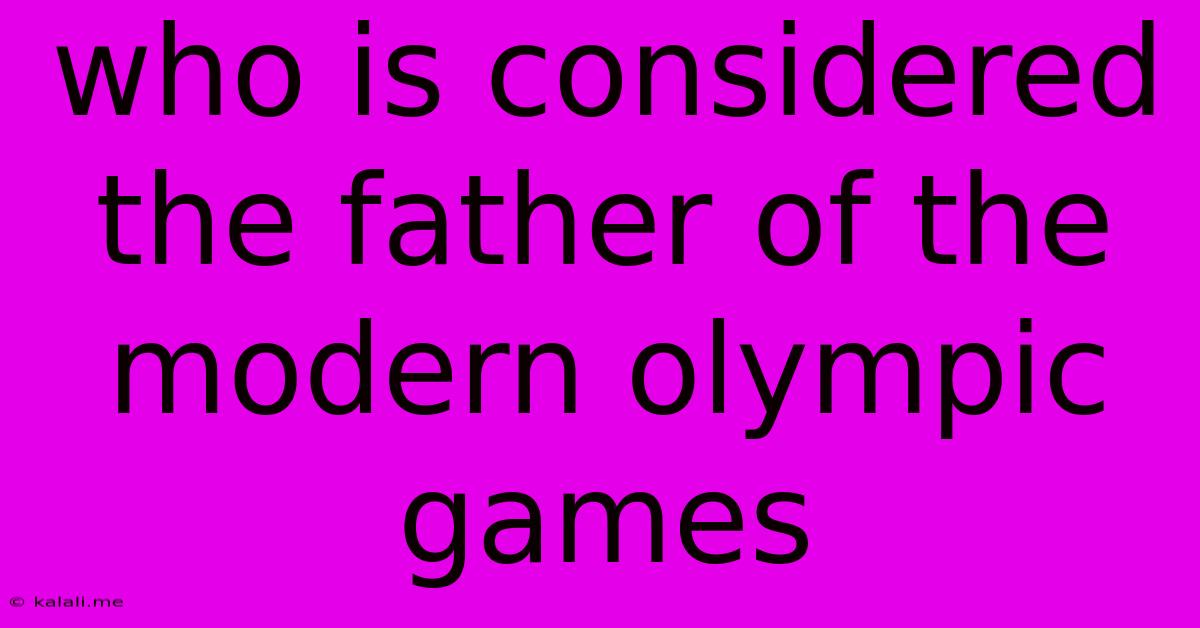Who Is Considered The Father Of The Modern Olympic Games
Kalali
Jun 14, 2025 · 3 min read

Table of Contents
Who is Considered the Father of the Modern Olympic Games?
Pierre de Coubertin, a French baron, is widely considered the father of the modern Olympic Games. His tireless efforts and vision were instrumental in reviving the ancient Olympic tradition in the late 19th century. This article delves into his significant contributions and the legacy he left behind. Understanding his role is key to grasping the history and impact of the Olympics as we know them today.
Coubertin's Vision: Reviving Ancient Ideals
Coubertin wasn't merely interested in athletic competition; he envisioned the Games as a tool for promoting international understanding, peace, and education. He believed in the power of sport to unite nations and foster a sense of global citizenship. This idealistic perspective, rooted in his study of ancient Greece and its Olympic traditions, heavily influenced his drive to re-establish the Games. He wasn't simply focused on the athletic events themselves but also on the broader cultural and societal impact they could have. This holistic approach is a cornerstone of the modern Olympic movement.
More Than Just an Idea: Action and Perseverance
Coubertin's vision didn't remain confined to theory. He actively campaigned for the revival of the Olympic Games, tirelessly promoting his idea across Europe and beyond. He faced numerous obstacles, including skepticism and logistical challenges, but his persistence proved crucial. He played a key role in establishing the International Olympic Committee (IOC), the governing body responsible for organizing and overseeing the Olympic Games. The formation of the IOC in 1894 was a pivotal moment, marking the formal beginning of the modern Olympic era.
The First Modern Olympic Games: Athens 1896
The first modern Olympic Games, held in Athens in 1896, marked the culmination of Coubertin's years of effort. While the Games were smaller in scale than today's spectacles, they served as a powerful symbol of his vision and marked the beginning of a global sporting phenomenon. The success of the Athens Games solidified Coubertin's position as the driving force behind the revival of the Olympics. The subsequent Games, built upon the foundation he laid, expanded significantly, illustrating the enduring impact of his work.
Coubertin's Lasting Legacy: Beyond the Games
Coubertin's legacy extends far beyond the organization of the first modern Olympic Games. His emphasis on amateurism, albeit later challenged and modified, shaped the early ideals of the movement. He also championed the inclusion of women in the Games, a significant step towards greater inclusivity. His contribution to the development of the Olympic Charter, the fundamental document of the IOC, remains a vital part of the Olympic governance structure. Understanding his role is crucial to appreciating the evolution of the Games from their revival to their present-day status as a global phenomenon.
Conclusion: The Enduring Influence of a Visionary
Pierre de Coubertin’s contribution to the world is immeasurable. He is rightfully recognized as the father of the modern Olympic Games due to his relentless pursuit of a vision that transcended mere athletic competition. His commitment to internationalism, education, and the unifying power of sport continues to inspire the Olympic movement and leaves an indelible mark on global culture. His legacy serves as a testament to the power of vision, perseverance, and the enduring appeal of the Olympic ideal.
Latest Posts
Latest Posts
-
The Average Salinity Of Seawater Is
Jun 15, 2025
-
What Is The Least Common Multiple Of 12 And 27
Jun 15, 2025
-
Which Of The Following Is An Example Of Multi Factor Authentication
Jun 15, 2025
-
Which Of The Following Is Not A Metamorphic Agent
Jun 15, 2025
-
Choose The Correct Html Element For The Largest Heading
Jun 15, 2025
Related Post
Thank you for visiting our website which covers about Who Is Considered The Father Of The Modern Olympic Games . We hope the information provided has been useful to you. Feel free to contact us if you have any questions or need further assistance. See you next time and don't miss to bookmark.